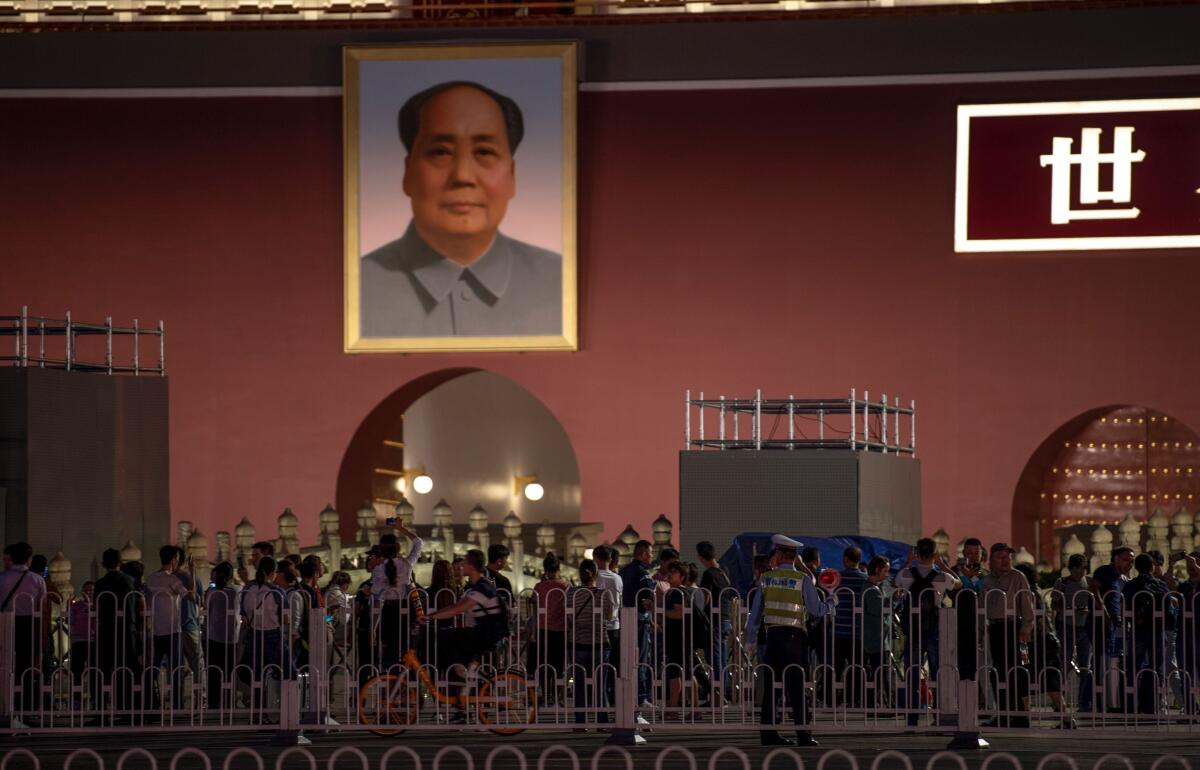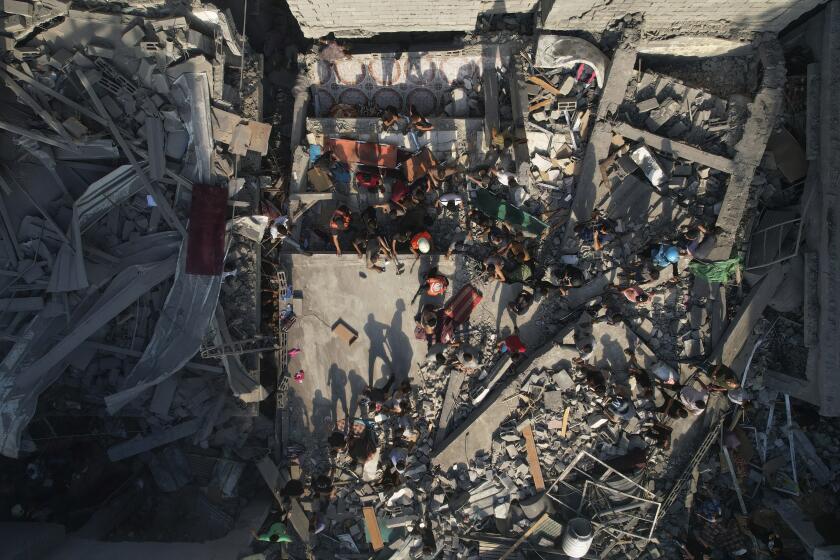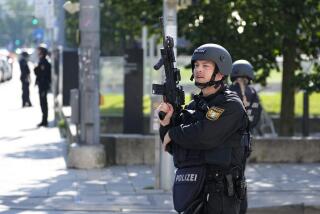Employee at Israeli Embassy in Beijing attacked and hospitalized

- Share via
BEIJING — A 50-year-old Israeli man who works at the Israeli Embassy in Beijing was stabbed Friday in front of a supermarket, Chinese police and the Israeli government said.
Beijing police said they had arrested a suspect, a 53-year-old foreign man. They described the victim as a family member of an Israeli diplomat. No motive was given for the attack, and it was unclear if it was connected to the war between Israel and the militant group Hamas.
“The employee was transferred to hospital and he is in a stable condition,” an Israeli government statement said, without giving additional details.
A video posted on social media showed a man with a knife grappling with another man on the ground and stabbing him several times, leaving a trail of blood stains on the sidewalk.
People working in the area said they heard the victim shouting as police cars and an ambulance arrived. A police cordon was set up and the blood later washed away.
The stabbing occurred as Muslims across the world took to the streets in large protests after Friday prayers over Israel’s intense bombing campaign in the Gaza Strip, following the brazen attack by Hamas militants against Israeli civilians and soldiers in southern Israel last Saturday.
Also Friday, Israel sharply criticized China’s statement about the Hamas attack. Israel’s Foreign Ministry said its ambassador in Beijing, Rafi Harpaz, had expressed his country’s “deep disappointment” to China’s envoy for the Middle East, Zhai Jun. The two diplomats talked by phone Thursday.
There was “no clear and unequivocal condemnation of the terrible massacre committed by the terrorist organization Hamas against innocent civilians and the abduction of dozens of them to Gaza,” the Israeli statement said. “The Chinese announcements do not contain any element of Israel’s right to defend itself and its citizens, a fundamental right of any sovereign country that was attacked in an unprecedented manner and with cruelty that has no place in human society.”
Asked about the Israeli statement, Chinese Foreign Ministry spokesperson Wang Wenbin said that China opposes acts harming civilians and violating international law.
“China will continue to work unremittingly for de-escalation of the situation and the resumption of peace talks,” he said.
Palestinian Americans with Gaza connections struggle with feelings of helplessness over violence after Hamas’ attack and Israel’s retaliation.
Chinese Foreign Minister Wang Yi, speaking at a joint news conference with the European Union foreign policy chief, said that China’s Mideast envoy would travel to the region soon to work toward a cease-fire and de-escalation.
China has supported the Palestinians in their demand for an independent state. “Israel has the right to establish a state, and so does Palestine,” Wang said, saying the failure to create a Palestinian state is the root cause of the conflict.
In Beijing, several plainclothes police officers were stationed outside the Israeli Embassy in addition to the normal contingent of uniformed officers. Some 1.25 miles away at the Palestinian Embassy in Beijing, plainclothes officers were also on hand, and one was tightening wires on a fence.
Since the war broke out, antisemitic remarks have surged on Chinese social media. Bombarded with hostile messages, the Israeli Embassy in Beijing is filtering comments on its Chinese social media account.
The embassy selected a comment that said, “Support Israel! Destroy the terrorist organization!“ — the remarks got 5,700 likes.
Chinese state media have blamed the United States for fanning tensions in the region.
“The Chinese government has always propagated a narrative that places the blame squarely on Israel, a key U.S. ally, because this aligns with a key objective of [the ruling Communist Party’s] propaganda: to undermine the U.S. in the international community,” said Yaqiu Wang, research director for China, Hong Kong and Taiwan at Freedom House. “This time, it is no exception.”
While the United States remains Israel’s top ally, China in recent months had tried to reach out to Israeli Prime Minister Benjamin Netanyahu’s government as tensions had risen with Washington over Netanyahu’s planned overhaul of the country’s judiciary, which sparked months of Israeli protests.
U.S. Secretary of State Antony J. Blinken and Defense Secretary Lloyd J. Austin III were in the region Friday in support of Israel, and President Biden also has strongly denounced the Hamas attack. America also has sent additional arms to Israel, deployed one aircraft carrier group and plans to send another to discourage a regional escalation as Israel prepares for a possible ground offensive in Gaza.
The U.S. ambassador to China, Nicholas Burns, wrote on the social media platform X that “we are shocked by today’s attack on an Israeli diplomat in Beijing,” adding that the U.S. Embassy had offered its full support to the Israeli Embassy and the Israeli community in China.
U.S. Senate Majority Leader Charles E. Schumer (D-N.Y.), meeting with Chinese leaders in Beijing earlier this week, voiced dissatisfaction over the initial Chinese statement on the deadly Hamas incursion.
Schumer later said he was gratified when a Foreign Ministry spokesperson later added that China is “deeply saddened by the civilian casualties” and “opposes and condemns acts that harm civilians.”
Gambrell reported from Jerusalem. Associated Press researcher Wanqing Chen in Beijing and writer Didi Tang in Washington contributed to this report.
More to Read
Sign up for Essential California
The most important California stories and recommendations in your inbox every morning.
You may occasionally receive promotional content from the Los Angeles Times.











